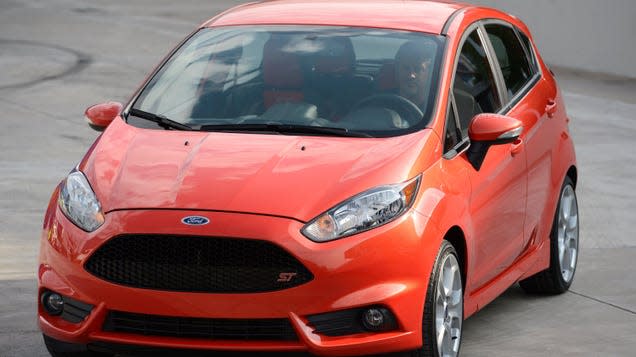Ford is dropping production of its most popular car to focus on EVs

The birth and death of the Ford Fiesta were bookended by global energy crises.
The car was rolled out in 1976, when the world urgently needed more energy-efficient vehicles after gas prices spiked following the OPEC oil embargo. This week Ford announced it will stop European production of its classic Ford Fiesta sedan in 2023 in favor of electric vehicle production in Europe, now in the throes of another energy crisis as Russia and Europe sever oil and gas ties.
Read more
It’s another sign of the electrification of the European car market, said Tim Urquhart, a European principal automotive analyst at IHS Markit. “It certainly reaffirmed their commitment to electrification and a refocusing of their assets,” he said.
The move marks the 119-year-old company’s latest attempt to transform itself into an electric vehicle (EV) company. Ford has stumbled in the EV era. Impatient with the pace of change, investors have pushed the company’s new chief executive, Jim Farley, to redouble his efforts to release a full line of EVs representing 2 million electric vehicles each year, around one-third of global production. (Ford now expects about half its sales to be all-electric by 2030).
Ford had already announced it would stop selling almost all cars in North America to focus on more profitable SUVs and crossovers in 2018, and then started a $50 billion push to build electric vehicles starting to hit the market. Ford doesn’t expect its EV business, what it calls “Ford Model e” (separate from the company’s internal-combustion engine unit Ford Blue), to be profitable until 2025.
The rough road ahead
Automakers are making hard choices amid a shortage of chips and auto parts, as well as unprecedented demand for EVs. To boost profits, Ford and others are dumping cheaper vehicles in favor of high-priced luxury models and pouring that cash into innovation.
The Fiesta’s demise was one step in these plans. Once the best-selling car in Europe, the Ford Fiesta will end production in the EU a year earlier than planned amid declining sales (Ford stopped producing the vehicle in the US in 2018). By 2030, Ford wants all of its passenger vehicles in Europe to be fully electric. The company already has seven EVs in the works for Europe, and is converting a plant in Cologne, Germany, to produce 200,000 EVs a year in 2023 before producing batteries in 2024.
That’s likely to boost Ford’s EV plans for the US where tax credits in the Inflation Reduction Act promise to fuel demand and offset the price tag for new production facilities. “Anything that makes it easier to sell electric cars in the US should make it easier to sell electric cars globally,” Brauer said. “The US is probably one of the least electric car-friendly countries.”
More from Quartz
Sign up for Quartz's Newsletter. For the latest news, Facebook, Twitter and Instagram.
